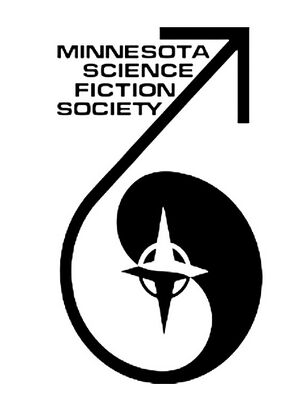Minn-StF
The Minnesota Science Fiction Society – Minn-stf or MnStf for short – came formally into being on November 25, 1966, at the Minnesota Technolog office at the University of Minnesota (or, possibly, at Frank Stodolka's parents' house -- sources differ on the location, but not the date). (See Minneapolis for some pre-Minn-StF organizational details.)
When MnStf outgrew the Technolog offices, it met at Golub's Bookstore and then at the Pillsbury-Waite Cultural Center, but eventually found its permanent home at members' houses.
Known as Crazy Minneapolis Fandom through the 1970s and into the '80s, the club met every other week for decades and it now meets twice a month in members' homes. The club sponsors the annual Minicon on Easter weekend. Minn-stf's spirit was perhaps best described by Patrick Nielsen Hayden, who observed, "There are three fannish centers in the country – Boston, Los Angeles and Minneapolis. Boston is Law, Los Angeles is Chaos and Minneapolis is Faerie."
Minn-StF (historically sometimes pronounced "Minn-stef", but now almost always "Minn-stiff") is dedicated to furthering the appreciation of science fiction and fantasy literature. Minn-StF's "meetings" are actually parties. The traditional start time for a Minn-StF meeting is 2 p.m., but most people don't show up till 4 p.m. or so unless the "meeting" is a picnic or pool party.
Einblatt! is the clubzine which is mainly a calendar of events. Rune is the very sporadic club genzine. (There was a ten-year gap between Rune 86, published in March 2002, and Rune 87, dated October 2012.) Minn-Stf also publishes a fan fiction fanzine named Tales of the Unanticipated.
In addition to Minicon (a regional), Minn-StF usually runs a fallcon, a relaxacon (its name changes frequently), the Minneapolis in '73, a not-a-hoax bid Worldcon bid, and the Minneapolis in 2073 Worldcon bid.
Minn-StF is officially agnostic when it comes to spelling, hyphenating, capitalizing the club's nickname. Minn-StF, MNstf, Minn-stf, and other variations are all acceptable. The "StF" came from "scientifiction." As Jim Young wrote in the Minicon 1 program book: "Many will wonder how the letters 'stf' were derived from 'Science Fiction Society'. Truth is, they weren't. 'Stf' is an abbreviation for the original term for science fiction - scientifiction. This was the word coined by the late Hugo Gernsback when he founded the first science fiction magazine, AMAZING STORIES. Due to the length of the word, it became popularly abbreviated as 'stf' - pronounced 'stef'."
Floundering Fathers[edit]
The founders of Minnstf were Ken Fletcher (Treasurer), Nate Bucklin (Secretary), Frank Stodolka (who was elected first president), Jim Young, and Fred Haskell (who claimed he was actually out getting a sandwich at the time). Haskell was elected Official Happy Deadwood, over his protests that a club needs members, too.
Other early members included Linda Lounsbury, Floyd Henderson, Richard Tatge, and Al Kuhfeld.
Rune Press[edit]
The Minn-Stf publishing house and small press which is responsible for Rune itself, Einblatt!, as well as the first 23 issues of Tales of the Unanticipated. Additionally, it published a number of small books:
| Year | Book | Author | Notes |
|---|---|---|---|
| 1979 | Maturity | Theodore Sturgeon | A short story collection and bibliography published for Minicon 15 |
| 1985 | Time Gum | ed Eleanor Arnason and Terry A. Garey | A speculative poetry anthology |
| 1988 | Time Frames | ed Terry A. Garey | A speculative poetry anthology |
| Club | 1966— |
| This is a club page. Please extend it by adding information about when and where the club met, when and by whom it was founded, how long it was active, notable accomplishments, well-known members, clubzines, any conventions it ran, external links to the club's website, other club pages, etc.
When there's a floreat (Fl.), this indicates the time or times for which we have found evidence that the club existed. This is probably not going to represent the club's full lifetime, so please update it if you can! |
